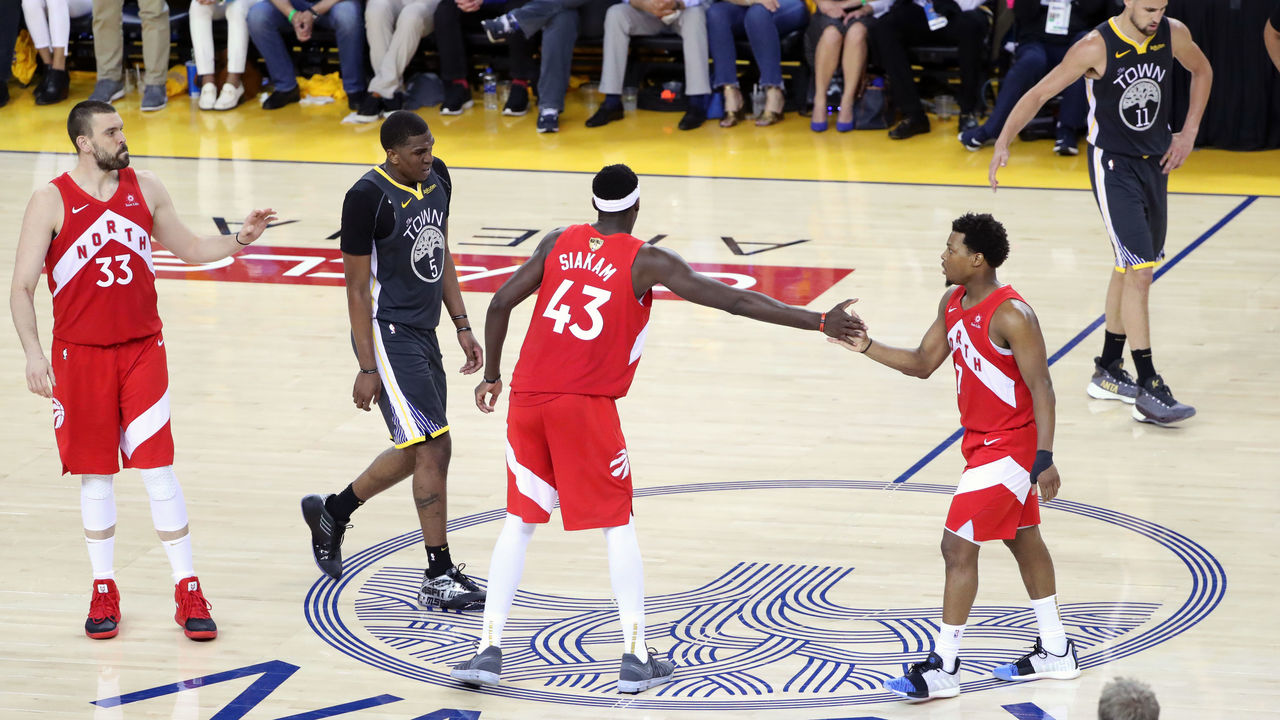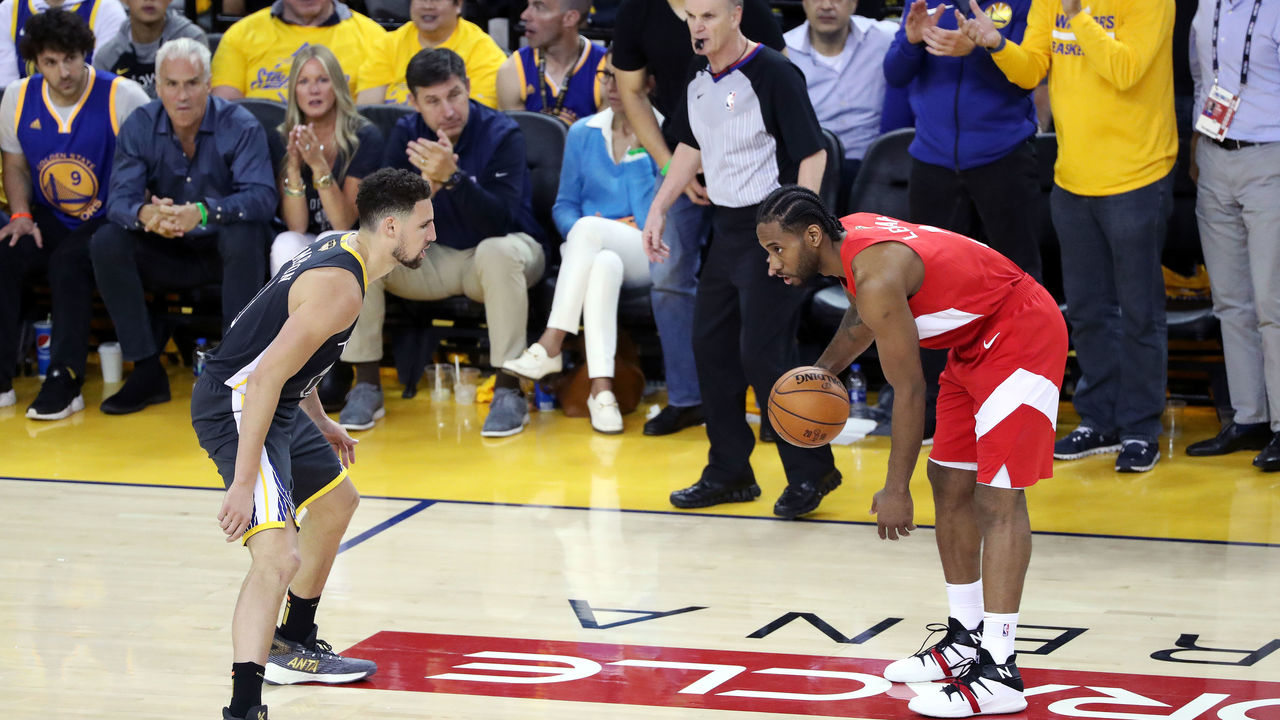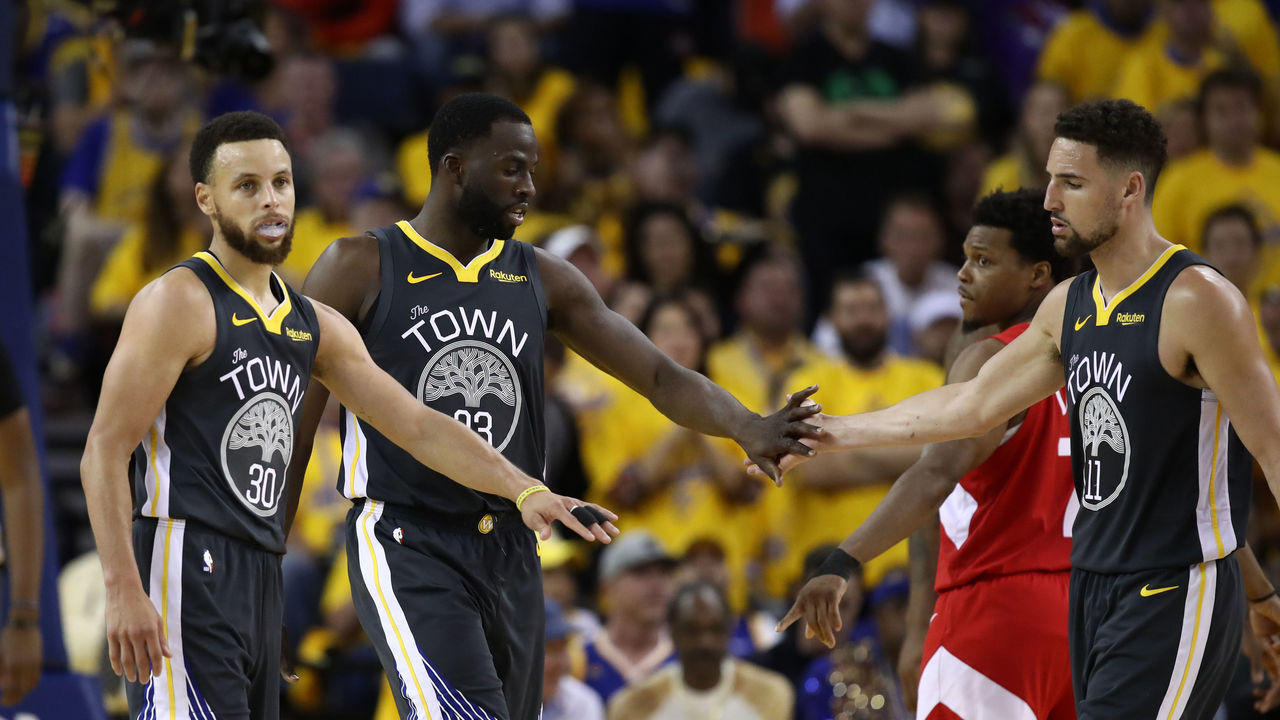The Raptors are unkillable, and the Warriors are running out of time
Maybe we only retroactively apply this rule of thumb, but it feels like all champions in all sports have an ineffable something. Some associative trait that explains the team's greatness in a way that goes beyond objectivity. A look. A feel. An aura.
The Toronto Raptors, a club that returned home from a five-day sojourn in the Bay Area with two road wins and a 3-1 NBA Finals lead over the Golden State Warriors, have an aura of unaffected calm.
The Raptors have been through the wringer this postseason, with a slew of imposing opponents pushing, prodding, and putting them in precarious spots. They survived a queasily taut Game 4 to win on the road against the 76ers in the second round, and Toronto later did the same in Game 7 of that series, which quite literally couldn't have been any closer. The Raptors also escaped a double-overtime Game 3 against the Bucks in the conference finals, when a loss would've put them in a presumably insurmountable 3-0 hole.
They then authored double-digit second-half comebacks in Games 5 and 6 of that series to reach The Finals, and they're now taking it to the two-time defending champs as if the Warriors are just another Eastern Conference foe. Through it all, many have noted the Raptors' businesslike approach to their increasingly monumental victories, with the team remaining stone-faced and hell-bent on completing the task at hand.
Maybe it's disingenuous to paint that as the reason for their success, rather than a product of it. Plenty of teams exude levelheadedness in tough moments but lack the ability to make that poise mean anything in the big picture.
Is this Raptors team tougher than Raptors teams that came before it? Maybe. But there's no doubt it's more talented, which, though not a guarantee of success, sure makes erasing a big deficit or winning a pivotal game easier. Calmness in the face of a challenge is a luxury afforded to the Raptors because they're extremely good.
And yet, the way they've repeatedly risen to meet those challenges over the past six weeks suggests a little something extra bubbling at the margins, something Kyle Lowry's uncanny ability to deliver a pocket pass can't capture. The same goes for Pascal Siakam's terrifying closeout speed, Marc Gasol's defensive IQ, Danny Green's timely shooting, and Kawhi Leonard's physical dominance.
True, the Warriors are wounded, not whole, and not themselves. But this Raptors team undeniably has the look and feel of a champion.
During their most recent display of counterpunching force - a diabolical second half in Game 4 at Oracle Arena - Toronto began to summon the same feeling the Warriors have monopolized the past few years: The outcome started to feel inevitable.

At the center of it all is Leonard, that paragon of stoicism and opacity and internal motivation; the silent assassin who, seemingly just by being himself, has molded his adopted team into his own image. He's the nexus at which the Raptors' talent and their defining characteristic meet.
"His demeanor has taken (over) a big part of our team," Lowry said after Game 4, parroting a through-line of the Raptors' playoff run. "We have some guys that are fiery and feisty, but we all kind of just stay levelheaded. Never get too up, never get too down."
All the pop psychology that often gets baked into sports analysis feels irrelevant with Leonard and the Raptors. Big moments don't unnerve them. Big runs from an opponent don't induce self-doubt. The team deals only in facts. To achieve Y, we have to do X. Where do we go after losing the first two games of the conference final on the road? Back to Toronto for Game 3, of course.
"Athletes at the height of their powers make literalness into a mystery all its own, simply by becoming completely absorbed in what they're doing," Richard Ford once wrote. Leonard's literalism extends beyond his delightfully dry answers to media questions. He brings that same approach to his craft. He isn't interested in reflection, or projection. He lives in a perpetual present.
Elsewhere, the 2018-19 season showed, many times over, how the impending free agency of a star player can derail a team from the inside. The Raptors have avoided that fate, which is a credit to both Leonard and his teammates. All year, Toronto has managed to stay focused on the next day's work while tuning out everything else, not just the external noise but the internal uncertainty. Leonard has often preached embracing the moment throughout this playoff run, and the team is following his lead.
Coming out of halftime trailing by four points in Friday's Game 4 - a game in which all non-Leonard Raptors had combined to score three points and shoot 1-of-13 in the first quarter - Kawhi promptly hit a pair of stone-cold threes to give the Raptors their first lead. That kicked off a legacy-defining third quarter for the three-time All-Star (17 points on 10 shooting possessions, five rebounds, an assist, a steal, a plus-16) in what's been a legacy-defining postseason.
Sure, there's already an NBA Finals MVP on Leonard's resume, earned at age 22 when he stared down LeBron James and helped end another dynasty. But this is something different entirely.
Leonard was still a role player for that Spurs team, with a playoff usage rate of 18.9 percent. This time he's the unquestioned alpha, using nearly twice as many possessions as he did five years ago. His postseason stat line of 31.1 points, 9.1 rebounds, 3.9 assists, 1.6 steals, and 62.9 percent true shooting is obscene.

There's a sense Leonard can see exactly what needs doing, and then just go do it, even when his body seems too compromised to cooperate.
There are games in which his shot looks even flatter than normal, and when everything is short and his legs appear weak. Yet he finds a way to hit shots that matter most. There are also games in which he moves gingerly for three quarters, sometimes hobbling as if he can barely walk, then suddenly flies in to outmuscle three defenders for an offensive rebound, or dunk on someone's head.
Consider his shaky shooting before Leonard's mammoth fourth quarter in Game 7 against the Sixers, or him being 0-of-7 from beyond the arc in Game 6 against the Bucks before hitting a crucial three from the corner late in the final frame. Remember the three he hit over Joel Embiid to ice Game 4 in Philly, or the two step-backs he drilled over Brook Lopez in the fourth quarter of Game 5 in Milwaukee. Remember that double-overtime game, when, in his 52nd minute on court, while playing on one good leg, he tipped the ball away from Khris Middleton, followed it, ripped it away from Malcolm Brogdon, and took it the other way for a dunk that helped secure the victory.
It's easy to be calm with that dude on your side.
"I don’t think you're ever going to rattle Kawhi," Draymond Green said after Game 4.
That's what these Warriors are up against, on top of a 3-1 deficit with their best player's status still in limbo and almost everyone else banged up.
Teams in Golden State's position are often burnt out at the tail end of a multiyear run, hoping to make one last stand against a confident and hungry upstart opponent that hasn't grown weary of the grind.
The Warriors looked awfully defeated during the fourth quarter of Game 4. With or without Durant, it will take a heroic effort to get up off the mat.

Right now, they just don't have enough guys while dealing with a ridiculous cavalcade of injuries, and the limitations of the Warriors' depth has become startlingly apparent.
Thompson played astonishingly well in Game 4 while injured, but he was running on fumes in the second half. The Warriors' big-man rotation, outside of Kevon Looney - who himself heroically played through a busted collarbone and did his damnedest - is a disaster.
The team's wing corps might be even direr. There was a crucial stretch in the third quarter of Game 4, with the Raptors making their push, when Golden State put Alfonzo McKinnie and Shaun Livingston on the floor at the same time. McKinnie was tasked with slowing down Leonard, who had eviscerated him all series any time they were matched up.
The Warriors couldn't do enough at the defensive end to protect an exhausted Steph Curry, who the Raptors relentlessly attacked. They couldn't provide Curry enough offensive support when the Raptors bamboozled them again with a box-and-one in the third quarter.
Maybe if Durant was healthy this series would look different, but there were red flags for the Warriors all season: defensive slippage, a lack of shooting support for Durant, Curry, and Thompson, the age-induced decline of their once-vital role players, and bouts of interpersonal disharmony.
When things start trending in this direction, the damage typically isn't reversible. The 2014 Heat rolled over. So did the 2011 Lakers, and the 2004 Lakers before them. Sometimes you can tell when a dynasty has run its course. You know what it looks and sounds like.
The Warriors seemed to be coming to grips with the reality they're facing following Game 4. There was the perfunctory talk about belief and "Why not us?" and "One game at a time," but also a profound sense of exasperation.
"Seems like every game it's somebody else," Green said, referring to Serge Ibaka's monster night in support of Leonard.
The NBA is cyclical, and its history can be neatly categorized into eras. The Golden State Warriors have dominated the past half-decade. If Durant decides to re-sign this summer, that may well continue.
If not, Monday's Game 5 could mark the end of an era.